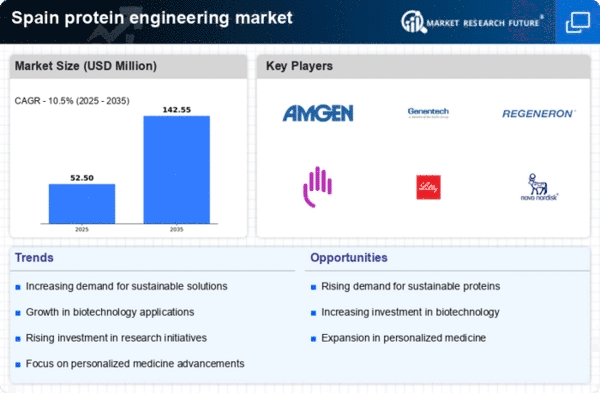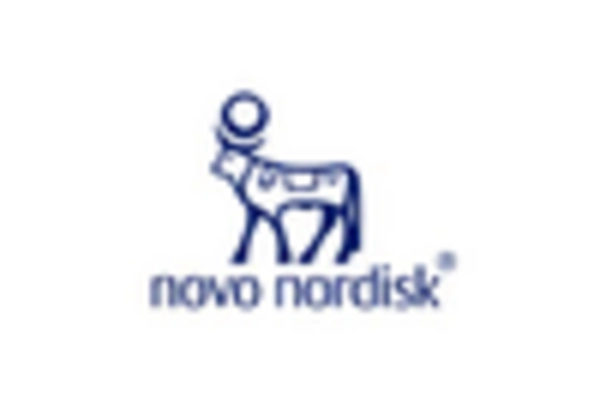Supportive Regulatory Environment
The regulatory framework in Spain is becoming increasingly supportive of innovations in the protein engineering market. Regulatory bodies are streamlining approval processes for biopharmaceuticals and genetically engineered products, which encourages investment and research in this field. In recent years, the Spanish government has implemented policies aimed at fostering biotechnology research, which has led to a 15% increase in funding for protein engineering projects. This supportive environment is likely to attract both domestic and international players to the protein engineering market industry, facilitating collaborations and partnerships that can accelerate product development and commercialization.
Rising Demand for Biopharmaceuticals
The protein engineering market in Spain is experiencing a notable surge in demand for biopharmaceuticals. This trend is driven by the increasing prevalence of chronic diseases and the need for innovative therapies. In 2025, the biopharmaceutical sector is projected to account for approximately 30% of the total pharmaceutical market in Spain. As a result, companies are investing heavily in protein engineering to develop novel therapeutic proteins and monoclonal antibodies. This growing demand is likely to propel advancements in protein engineering technologies, enhancing the capabilities of researchers and manufacturers alike. The protein engineering market industry is thus positioned to benefit from this upward trajectory, as it aligns with the broader healthcare objectives of improving patient outcomes and reducing healthcare costs.
Growing Interest in Personalized Medicine
The shift towards personalized medicine is significantly influencing the protein engineering market in Spain. As healthcare moves towards more tailored treatment approaches, the demand for engineered proteins that can be customized to individual patient needs is on the rise. This trend is expected to drive innovation in protein engineering, as companies seek to develop therapies that are more effective and have fewer side effects. By 2025, the market for personalized medicine in Spain is projected to reach €5 billion, with a substantial portion attributed to advancements in protein engineering. The protein engineering market industry is thus likely to play a pivotal role in the evolution of personalized healthcare solutions.
Increased Collaboration Among Stakeholders
Collaboration among various stakeholders is becoming a defining characteristic of the protein engineering market in Spain. Partnerships between academic institutions, research organizations, and industry players are fostering knowledge exchange and accelerating innovation. These collaborations are essential for translating research findings into practical applications, particularly in the development of new therapeutic proteins. In 2025, it is anticipated that collaborative projects will account for over 40% of the total research funding in the protein engineering market industry. This trend not only enhances the capabilities of individual organizations but also strengthens the overall ecosystem, driving growth and competitiveness in the market.
Technological Advancements in Protein Engineering
Technological innovations are significantly shaping the protein engineering market in Spain. The advent of CRISPR technology and advanced computational tools has revolutionized the way proteins are designed and modified. These advancements enable researchers to create proteins with enhanced functionalities and stability, which are crucial for various applications, including therapeutics and industrial enzymes. In 2025, it is estimated that the market for protein engineering technologies will grow at a CAGR of 12%, reflecting the increasing reliance on these tools in both academic and commercial settings. The protein engineering market industry is thus likely to see a proliferation of new products and services that leverage these cutting-edge technologies, fostering a competitive landscape.
















